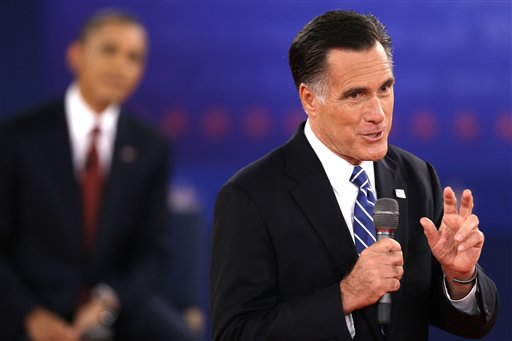For months, President Barack Obama has used the auto bailout as the signal example of economic success under his administration. And he has attacked rival Mitt Romney for arguing, in a New York Times op-ed in November 2008, that the auto industry should have been allowed to go bankrupt. In Tuesday’s debate, however, Romney destroyed Obama’s argument, forcing Obama to admit his role in the industry’s bankruptcy.
In response to a question about jobs–from a college student highly unlikely ever to work in an car factory–Obama unloaded his familiar talking points on the auto bailout:
You know, when Governor Romney said we should let Detroit go bankrupt, I said, we’re going to bet on American workers and the American auto industry, and it’s come surging back. I want to do that in industries, not just in Detroit but all across the country.
Romney’s response:
My plan was to have the company go through bankruptcy like 7-Eleven did and Macy’s and Continental Airlines and come out stronger. And I know he keeps saying, you wanted to take Detroit bankrupt. Well, the president took Detroit bankrupt. You took General Motors bankrupt. You took Chrysler bankrupt. So when you say that I wanted to take the auto industry bankrupt, you actually did.
Obama did not know what to say. He had to admit that, yes, he did take the companies into bankruptcy, but not bankruptcy-bankruptcy (much like Whoopi Goldberg’s defense of Roman Polanski: it wasn’t rape-rape).
Unable to answer Romney’s charge, Obama resorted–desperately, it seemed–to lying about what Romney said in the very New York Times article that was the entire basis for his misleading attack on Romney’s auto industry policy:
Candy, what Governor Romney said just isn’t true. He wanted to take them into bankruptcy without providing them any way to stay open, and we would have lost a million jobs. And that–don’t take my word for it; take the executives at GM and Chrysler, some of whom are Republicans, may even support Governor Romney. But they’ll tell you his prescription wasn’t going to work.
I’m not sure what “executives at GM and Chrysler,” who now serve at the government’s whim (recall how GM chief Rick Wagoner was kicked out by Obama), would say. But here is what Romney said about the auto industry and bankruptcy in November 2008:
The American auto industry is vital to our national interest as an employer and as a hub for manufacturing. A managed bankruptcy may be the only path to the fundamental restructuring the industry needs. It would permit the companies to shed excess labor, pension and real estate costs. The federal government should provide guarantees for post-bankruptcy financing and assure car buyers that their warranties are not at risk.
In a managed bankruptcy, the federal government would propel newly competitive and viable automakers, rather than seal their fate with a bailout check.
It should also be noted that Ford, the one American car company that did not take a bailout, returned to profitability fastest. Meanwhile, Obama’s auto bankruptcy, which followed only after giveaways to his union friends, takeaways from secured creditors, and the destruction of non-union pensions, is a loser for the taxpayer. GM especially is still in severe trouble, and the government would lose money if it sold its stake today.
In exposing Obama’s false arguments about the auto industry, Romney deprived the Obama campaign of its only real economic crutch. For months, the Obama campaign mantra has been: “Osama bin Laden is dead, and General Motors is alive.” The first half of that mantra was blunted by the Obama administration’s failures and lies about the 9/11 embassy attacks, and now the second half of the slogan is has lost its edge, too.
Though Obama made the second debate a much closer contest than the first, Romney dominated on the economy, for the second time. He missed an opportunity–thanks to the moderator’s false fact check–to point out Obama’s lies and evasions on Libya, but he will have another chance in the foreign policy debate on Monday night. But he put the Obama campaign’s distortions on the auto bailout to rest, just in time–and for good.

COMMENTS
Please let us know if you're having issues with commenting.